Vivienne Diary – May/June 2015
May: Andreas bought me Goethes’s “Sorrow of Young Werther”. It was the first tragic novel and it caused a sensation – and was one of the factors which led to the Romantic movement. It was translated into languages across the world. Napoleon took “Werther” on his Egyptian campaign in 1798 and when he met Goethe in 1808 he told him that he had read the book seven times – he decorated him. It is still a model of literature in the education curriculum in Germany.
Werther was a model for the Romantic. In his self-portrait on the cover of my recent copy Phillip Otto Runge is still wearing in 1805, thirty years later, Werther’s blue frock coat and buff leather waistcoat and breeches.
The Romantic movement waited until after the Napoleonic Wars before it took off.
The book is based on a true story combining Goethe’s own experience and that of another man he knew, called William Jerusalem, who shot himself after declaring his love to another man’s wife. It is the first confessional novel and takes the form of letters from Werther to “Willhelm”, a brother, a one-sided communication.
Goethe wrote “Werther” in four week at the age of 24. Goethe has a channel for his passions, his writing. His hero follows his heart and loses himself.
Young Werther was the happiest of men. Under the sun he lay in the warm grass and knew the teeming life of the microbes. His heart was his proudest possession and he marvelled at the power of his love which fitted in the whole creation; his soul rose in ecstasy to meet its heaven, the wind and the stars and the divine mystery of the cosmos.
I write this in criticism: he believed that it was noble to indulge his finer feelings beyond the bounds of sanity. Because of this practice, his love for another man’s wife – convinced that she was his one soul mate – turned from joy and collapsed into the unbearable pain of depression until at last he found the calm to shoot himself under the self-delusion that his life was a sacrifice to her.
This is Werther reading to Lotte, the woman who is out of reach because she belongs to another.
Why was Werther so passionate/desperate? Why did the Romantics abandon themselves to the task of living on the edge?
The first reason given is always that the Romantics reacted against the cold dry reason of the 18th century Enlightenment. The “Encyclopedia” was the engine which clarified opinion during this time. Diderot was in charge of it and it was a monumental task; it attempted to amass all knowledge and great thinkers contributed essays.
But in general, its programme of education had a moral purpose: to combat 1.) the supernatural and fabulous in history, 2.) religion on irrational grounds, e.g. the doctrine of eternal damnation, 3.) intolerance and persecution. In this Age of Reason they tried to preach morals through art which made it boring. The aim of education should result in a fairer society: “Liberty, Equality, Fraternity.”
The Romantics didn’t agree that reason gave truth, they found it limiting: knowledge isn’t just stuff you can measure and argue about. And it was all too materialistic. The heart gives knowledge through direct experience and one’s soul experienced eternal truth. Feelings define a man, not moral arguments, they said.
So the Romantic poets and their muses went round showing off their noble emotions; posing as beautiful women without mercy, dying saints, vampires, over-sensitives, wild gypsies, necromancers, coprophiles, they flew to anything morbid or exotic, deviant, virginal or mystic; they looked like medieval dandies or like they’d come through a storm: consumers of an idea.
Today we are still Romantics, millions of posers who just consume – any old rubbish will do; status lies in catching the latest thing. That’s why we have no original ideas.
So I didn’t feel so sympathetic to “Werther”. But do read it. It’s an important book and wonderfully written. And it’s about someone young and sincere and yes, noble, letting himself get carried away: it was to become fashionable to rebel against the unfair and despicable rigidity of the class system. That rigidity was abolished within the French salon, they were a crucible of culture; habitués were welcomed for their talent.
It is difficult to choose a passage from “Werther” because the writing is everywhere splendid. This entry of the diary shows the real gap of the classes in his day.
Werther helps a young woman lift her pitcher of water onto her head. Shows the gap between the classes.
Werther would like to work to please his family – his father is a lawyer. But he doesn’t have to, he is rich.
An incident occurs whereby Werther is at the home of the count who likes his company because he is clever, yet when the local aristocrats arrive for an evening soirée Werther is still there and doesn’t realize in time that he is an embarrassment – because he is socially beneath them. The count has to tell him and he quickly leaves but then the next day the gossip is that the count threw him out. This makes his life so uncomfortable that he leaves town. At his level of the social hierarchy, Werther without a job was a misfit. It may have been a factor in the suicide of Jerusalem that he was about to lose his job.
Matthew Arnold understood knowledge, it comes to you via “sweetness and light”, heart and head. You need both to truly engage with the world, and it is not easy. You develop understanding by searching and discriminating over time.
Fri 5 Jun: Andreas and I to the Barbican. Murray Peraiha, piano. Total perfection. Which means it’s total and it’s perfect, the whole world fits into the time of this performance. Quotes from the programme, Peraiha’s approach is uniquely intelligent and deeply considered: he puts his virtuosity absolutely at the service of the music; Peraiha’s extraordinary pianism is a sacrament of purification and a kind of return to an age of pianistic innocence.
Mon 8 Jun: Andreas accompanied me to Dusseldorf where I was to give a talk next evening on any subject I liked for a fee. This is a regular event for speakers with ideas, sponsored and attended by German businessmen and also by the ticket-buying public. It was sold out. An audience of 2000.
The event was organised by Peter whose company is Marketing Gesellschaft Moenchengladbach. He looked after us so well and our schedule was comfortable. My talk was about the Politicians R CRIMINALS Campaign and at the word CRIMINALS spontaneous clapping broke out. Very encouraging – helps me feel I’m on the right track – getting through.
I gave my fee to Cool Earth and at Peter’s suggestion we had hung their banners in the reception area. Matthew Owen came, so afterwards I sat signing my biography and Matthew sat by my side giving out leaflets to those queuing and we raised another €12,000.
Mon 9 Jun: Teddy comes to work for Climate Revolution. He, together with Cynthia and Cindy, makes up our full team of three. Teddy is Andreas’ cousin. His name is Otmar Kronthaler. When his mother brought the new baby home and put him on the floor in his basket his 15 month old brother toddled over, put his arms out and said “Teddy”.
Wed 10 Jun: Dusseldorf is famous for its textiles which now include industrial textiles like car seat covers and on the 3rd day we were shown round a soon to be opened textile museum.
The machines are all operational and we watched them demonstrated. My mother was a weaver and she had 24 looms; she replaced the bobbins and tied the threads as they were about to run out and whilst the machines were running, so that none stopped.
During the demonstration the machines got faster and faster. Something scared me; it was that the smallest most simple innovation could unleash such power – at first just a bar of wood in the right place, then in a few more innovations; blinding thunder. I was scared by the machines because I am scared of the power of people.
The museum has an archive of a basement room filled with thousands of bottles of vegetable dyes, everyone a different colour; each of them needs its personal mordant to fix it and it will be thrilling to see one day the new colours applied. I expect most have never found a mordant. I once read a book called Mauve. The colour mauve was the first synthetic dye, made from coal tar. It became a rage; it was the only fashionable colour for a time during the 19th century and women wore no other colour. It was one of the most important discoveries ever made because from this the synthetic industry grew: synthetic fabrics and plastic and the whole perfume and pharmaceutical industry. I then gave a talk to students at the Textile School on the same subject as the CRIMINALS but also talking about the importance of culture. Cindy is now linking up with the students for Climate Revolution. We got back home in time to go to the Barbican but I was too tired but Andreas went to the concert with his friend Alex. Anne-Sophie Mutter performs Andre Previn’s Violin Concerto, conducted by the composer. Anne-Sophie is Previn’s wife. He is now old and frail but still one of the worlds giant conductors. Andreas and Alex: “ineffable”‘s the word – so good you can’t talk about it – beyond words.
Genius exists in the interpretive arts – music, ballet, theatre (It’s different everytime it’s performed). But as for pure art today, even if you accepted it as art (which I don’t) it’s ugly (Andreas probably accepts it as art – Jeff Coons? – on grounds that it is “relevant” – if it is then it reflects the world and that therefore means our world is shit).
Sun 14 Jun: Andreas and I to the Barbican. Mozart Violin Concerto No.3, Mahler Symphony No.1 (‘Titan’). Bernard Haitink conductor and Alina Ibragimova violin. Mahler really titanic. Haitink – I’ve had some of my most exciting times with the famous conductor and this was one of them. It is probably 20 years ago I remember stamping and whistling from the highest balcony at the end of Daphnis and Chloe. You can still buy cheap tickets. An orchestra is the high point of human achievement.
Wed 17 Jun: Andreas and I went to Milan to prepare the MAN show. I get time to talk to the models. I also checked Red Label – the new collection has arrived in the showroom for selling. It’s good.
Tues 23 Jun: Got back from Milan last night. Now off to Preston to support the fantastic local campaign against fracking. Its local but these people also protest nationally and internationally. They are “up to the hilt” informed re: the dangers of fracking. Tina Louise is one of the major spokespeople. She comes from Blackpool, near where Quadrilla fracked, then had to stop after they caused an earthquake.
I’m up here with Cynthia and my son, Joe, who concentrates his activism on fracking. His team is Talk Fracking and we have worked with Tina Louise before. Our CRIMINALS have no clue of the dangers of fracking or the immediate damage it would do to the economy. They are totally irresponsible, except to the GIANTS. They are pledged to the reflex action. “If it’s good for business, it’s good for everybody !?” (knee-jerk response from Vince Cable to John Hillary – from War on Want).
I speak around the idea, “Politicians R CRIMINALS” and because of that my speech gets reported on mainstream media. If we keep calling them CRIMINALS we’ll get through.
Major WIN! The Preston Council voted against Fracking.
Mon 29 Jun: Val Garland, the make-up artist we love to work with, comes to Battersea Studio. She wants us to contribute to a film she is making about her art for students. She looks lovely wearing one of our dresses like a coat.
– to be continued… uploading July Diary this Wednesday 26 August –


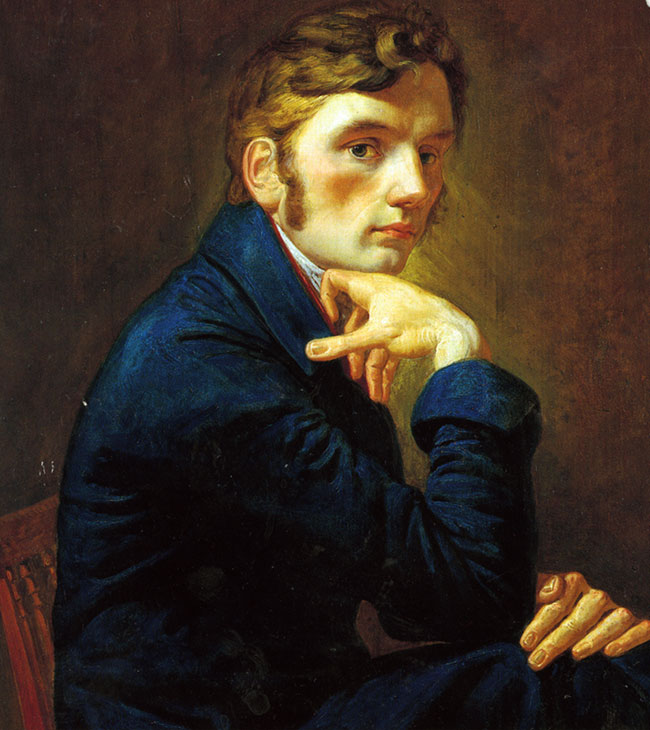
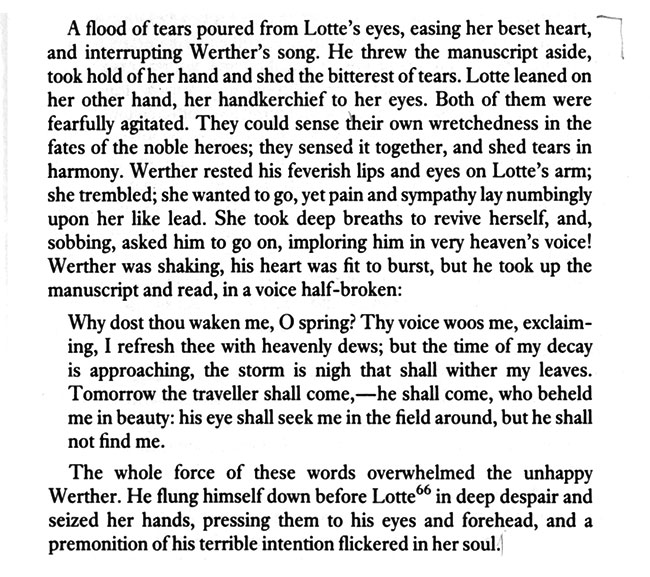
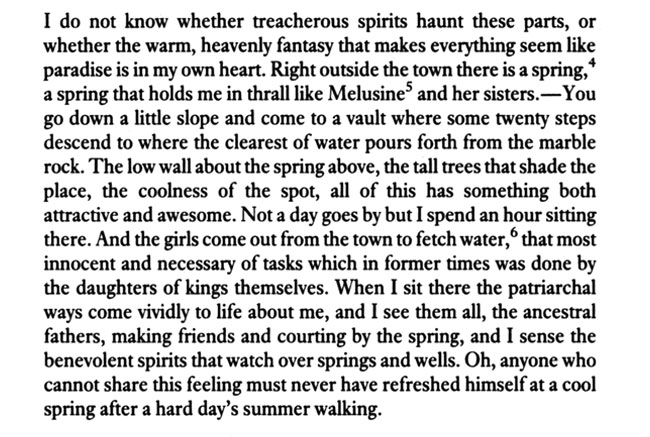

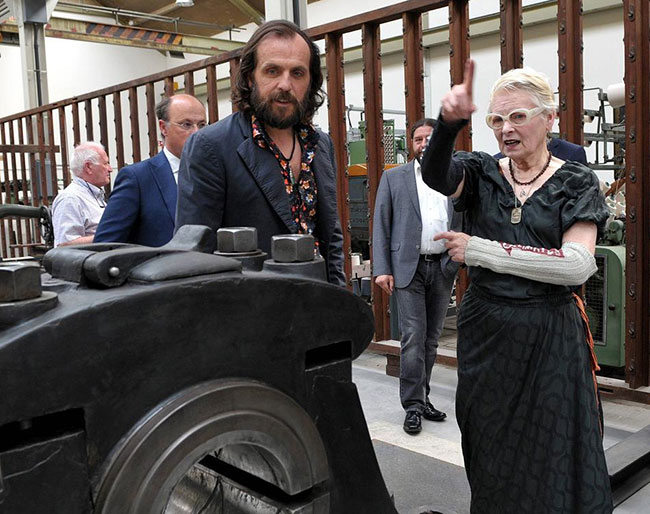
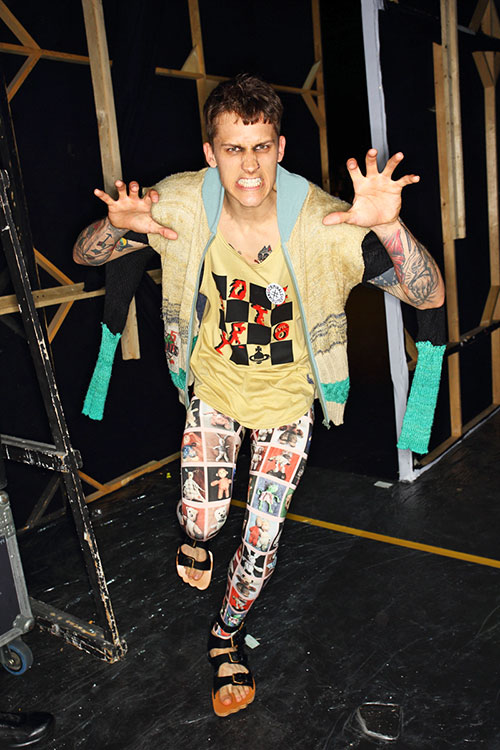
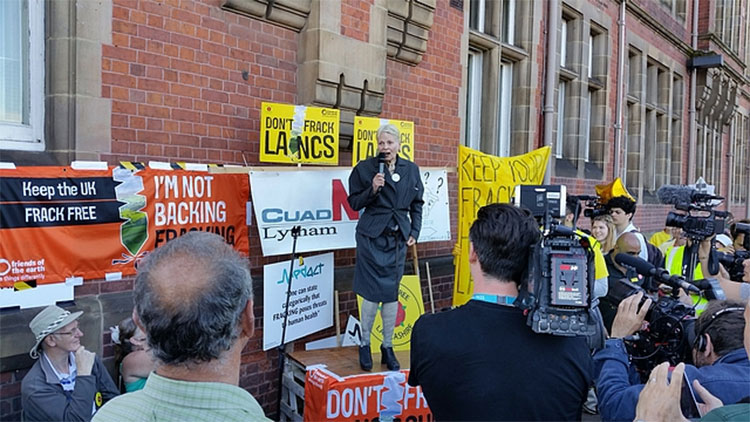


No comments yet